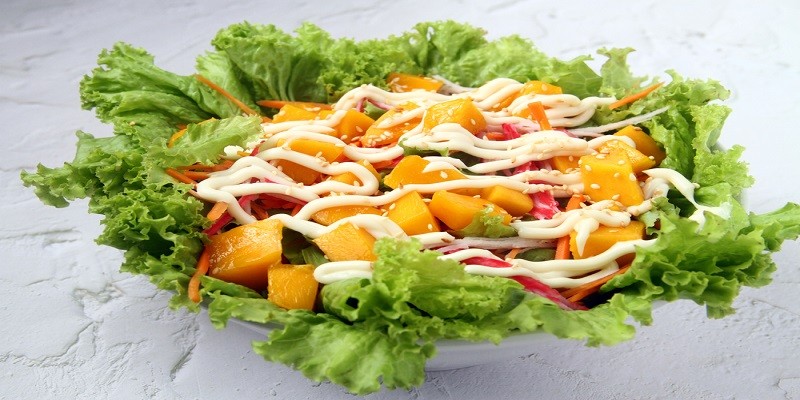Last Updated on July 31, 2024
Yes, you can eat Kani salad while pregnant, but it should be consumed with caution. Ensure that the imitation crab meat used in Kani salad is thoroughly cooked to avoid the risk of foodborne illnesses that can affect pregnancy.
Kani salad, popular for its delightful taste and accessibility in sushi restaurants, often raises concerns when it comes to consumption during pregnancy. This light dish primarily features imitation crab, which is cooked and safe in theory, but its accompaniments and the way it’s prepared can influence its safety. This article explores whether Kani salad is a suitable choice for pregnant women, delving into its ingredients, nutritional value, and potential risks.
What is Kani Salad?
Kani salad is a Japanese-inspired dish primarily made from shredded sticks of imitation crab, which is a processed seafood made of finely pulverized white fish mixed with starch, egg whites, and crab flavoring. The salad is typically tossed with mayonnaise and often enhanced with cucumbers, mango, and a variety of garnishes like tobiko or sesame seeds, offering a refreshing mix of sweet and savory flavors.
Nutritional Value of Kani Salad
| Nutritional Value | Details |
|---|---|
| Calories | Kani salad is relatively low in calories, making it a light meal option. |
| Protein | Contains moderate amounts of protein from the fish paste in imitation crab. |
| Carbohydrates | Primarily from starch used in the production of imitation crab and any added sugars in condiments. |
| Fats | Mostly from mayonnaise, which can be high in saturated fats. |
| Vitamins | May contain vitamins such as vitamin C if fresh vegetables or fruits are added. |
Risks of Eating Kani Salad During Pregnancy
| Risks | Details |
|---|---|
| Foodborne Illness | Imitation crab is precooked, but poor handling can introduce risks like listeriosis. |
| High Sodium | Imitation crab and added condiments can contain high levels of sodium, which should be consumed in moderation during pregnancy. |
| Allergens | Contains fish, a common allergen, and may contain other allergens depending on the ingredients used in mayonnaise and garnishes. |
Safe Ways to Eat Kani Salad During Pregnancy
When eating Kani salad during pregnancy, it’s crucial to ensure all ingredients are fresh and the dish is prepared in a hygienic environment. Opt for homemade Kani salad where you can control the ingredients, particularly the type and amount of mayonnaise and seasonings used, to keep sodium and unhealthy fats in check.
Alternatives to Kani Salad During Pregnancy
| Alternatives | Precautions |
|---|---|
| Fresh Vegetable Salad | Ensure all vegetables are thoroughly washed to remove any pesticides or bacteria. |
| Homemade Chicken Salad | Use pasteurized mayonnaise and well-cooked chicken to avoid any risk of salmonella. |
| Tofu Salad | Tofu is a great protein alternative if you’re avoiding fish; just ensure it’s adequately prepared and consumed fresh. |
Expert Tips
“Choose pasteurized or thoroughly cooked ingredients for salads during pregnancy to avoid the risk of foodborne diseases.”
“Monitor your daily sodium intake, especially when consuming processed foods like imitation crab.”
“If experiencing cravings for sushi or similar dishes, opt for fully cooked or vegetarian versions to stay safe.”
FAQs
Can Kani salad cause allergies during pregnancy?
Yes, Kani salad might trigger allergies due to ingredients like fish, eggs (in mayonnaise), and soy products used in imitation crab.
Is Kani salad high in mercury?
No, imitation crab is made from fish typically low in mercury, making it safer compared to high-mercury seafood.
Can I eat Kani salad from a buffet while pregnant?
It’s safer to avoid buffet-served Kani salad due to uncertain preparation standards and the potential for contamination.
How often can I safely eat Kani salad during pregnancy?
Consuming it occasionally and in moderation, ensuring it’s freshly made, minimizes any health risks.
What are the signs of food poisoning from Kani salad?
Symptoms may include nausea, vomiting, abdominal cramps, and diarrhea. Consult your doctor if symptoms appear.
Conclusion
Kani salad, while not inherently dangerous, requires cautious consumption during pregnancy due to risks associated with its ingredients and preparation. Prioritizing well-cooked, fresh, and safely prepared dishes ensures that you can enjoy this delightful salad without compromising the health of you or your baby. When in doubt, preparing Kani salad at home allows for better control over its safety and nutritional content.







